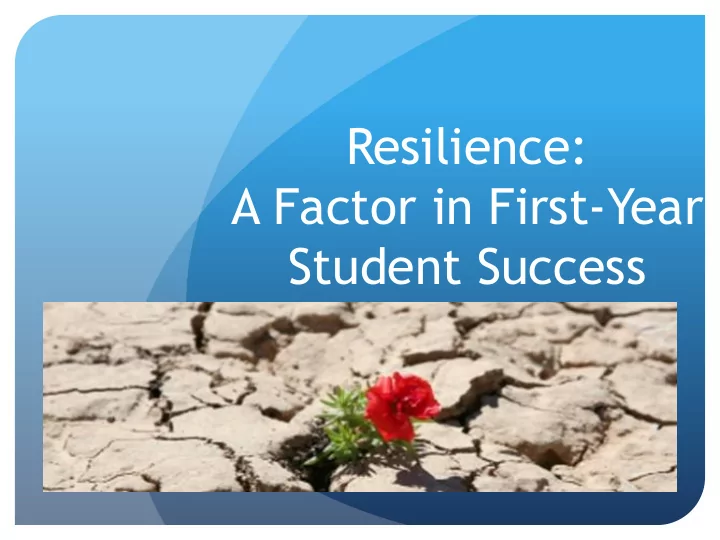

Resilience: A Factor in First-Year Student Success
Stuart Hunter Associate Vice President for University 101 Programs and the National Resource Center for The First-Year Experience and Students in Transition Alex Thomas Graduate Assistant for Campus Partnerships, University 101 Programs University of South Carolina
As a result of this presentation, participants will be able to: • Discuss the need to cultivate resiliency in students within the first year • Define resiliency and describe its uses • Indicate practices that contribute to a resilient community • Describe strategies that could be employed at their home institutions to cultivate resiliency in their students
Today’s First -Year Students Frequently or occasionally studied with 89.0% other students Frequently or occasionally performed 88.3% volunteer work Considered helping others who are in 72.2% difficulty as “essential” or “very important” (Eagan et al., 2014)
Today’s First -Year Students 2010 2014 29.1% Frequently “felt overwhelmed 34.6% by all I had to do” Frequently “felt depressed” 6.6% 9.5% (Pryor et al., 2010; Eagan et al., 2014)
Today’s First -Year Students 2010 2014 Emotional health is in the 51.9% 50.7% “highest 10%” or “above average” compared to peers (Pryor et al., 2010; Eagan et al., 2014)
Today’s First -Year Students 2010 2014 Expect a “very good chance” 66.4% 67.8% they will “make at least a ‘B’ average” (Pryor et al., 2010; Eagan et al., 2014)
Today’s First -Year Students • Higher expectations for themselves and their abilities • Lower self-reported abilities to cope
What is Resilience?
RESILIENCE the ability to persevere and adapt when things go awry (Reivich and Shatté, 2002)
Four Uses of Resiliency Overcome Steer Through Bounce Back Reach Out (Reivich and Shatté, 2002)
Mindsets
Fixed Mindset • Avoids challenges • Gives up easily • Sees effort as fruitless or worse • Ignores useful criticism or feedback (Dweck, 2007)
Growth Mindset • Embraces challe llenges • Persis sists in in th the face of f se setbacks • Se Sees s effort rt as th the path to mastery ry • Le Learns fr from criti riticis ism (Dweck, 2007)
Thriving
Thriving “Thriving implies more than just surviving in the college environment; it conveys that a student is fully engaged intellectually, socially, and emotionally, and is experiencing a sense of psychological well-being that contributes not only to his or her persistence to graduation, but also to success in life.” (Schreiner, 2012, p. 4)
Focus on framing of students’ strengths – personal tendencies that can be developed (Louis & Schreiner, 2012, p. 36)
(Henderson)
(Henderson)
Questions?
References Dweck, C. S. (2006). Mindset: The new psychology of success . New York, NY. Ballantine Books. Eagan, K., Stolzenberg, E. B., Ramirez, J. J., Aragon, M. C., Suchard, M. R., & Hurtado, S. (2014). The American freshman: National norms fall 2014. Los Angeles: Higher Education Research Institute, UCLA. Henderson, N. (2014). The Resiliency Quiz . Retrieved from http://www.resiliency.com/free-articles- resources/the-resiliency-quiz/. Louis, M. C., & Schreiner, L. A. (2012). Helping students thrive: A strengths development model. In L. A. Schreiner, M. C. Louis, & D. D. Nelson (Eds.), Thriving in Transitions: A Research-Based Approach to College Student Success (pp. 1-18) . Columbia, SC: University of South Carolina, National Resource for The First-Year Experience and Students in Transition. Pryor, J.H., Hurtado, S., DeAngelo, L., Palucki Blake, L., & Tran, S. (2010). The American freshman: National norms fall 2010. Los Angeles: Higher Education Research Institute, UCLA. Reivich, K., & Shatté, A. (2002). The Resilience Factor . New York, NY: Three Rivers Press. Schreiner, L. A. (2012). From surviving to thriving during transitions. In L. A. Schreiner, M. C. Louis, & D. D. Nelson (Eds.), Thriving in Transitions: A Research-Based Approach to College Student Success (pp. 1-18) . Columbia, SC: University of South Carolina, National Resource for The First- Year Experience and Students in Transition.
Recommend
More recommend